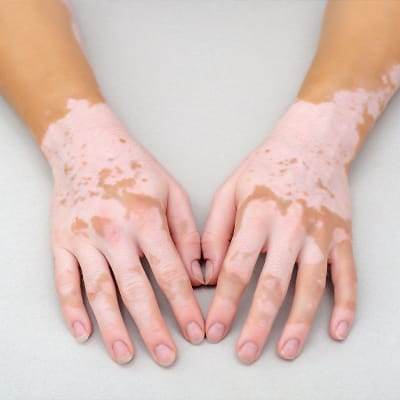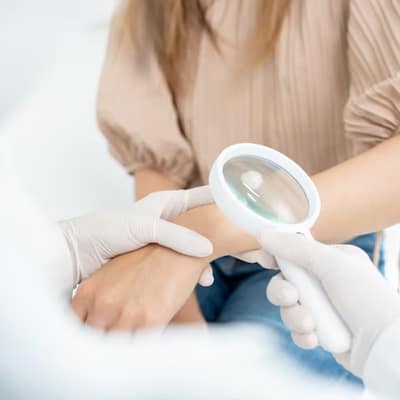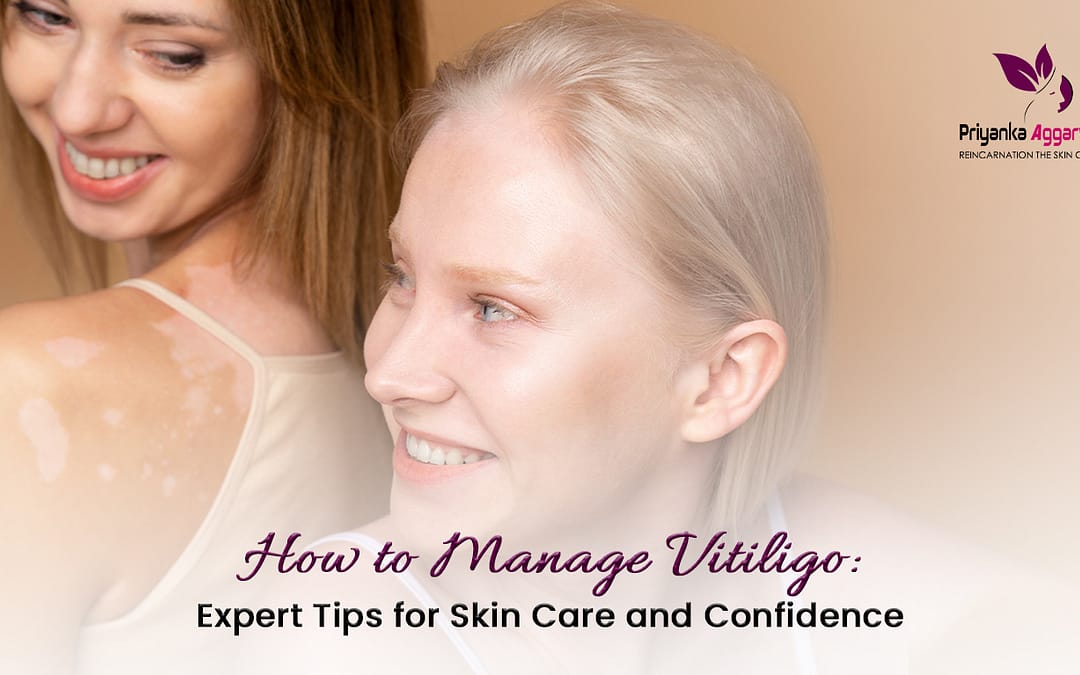In the recent era, where most of us are very conscious about how we look and need constant validation from the people around us, living with a skin concern like vitiligo can be very stressful. But here we are to assure you that you’re not alone in this journey, and with proper care, you can be back to the way you were bold and confident. In this article, we aim to discuss in depth how we can deal with vitiligo and the different treatment options that are available, so that it helps you make a difference in real life.
Table of Contents
What is Vitiligo?
Before going into the full details of how to manage vitiligo, it is necessary to understand what is the skin concern.
Vitiligo is a chronic disorder where you see visible white patches on your skin. It is because the melanin-producing cells stop functioning or even die, which leads to the skin losing its colour. It subsequently leads to the development of patches on your skin, including your face, arms, legs, and elsewhere.
Doctors haven’t been able to identify the key reason for vitiligo, but it is generally believed to be an autoimmune condition where your body attacks the melanin-producing cells, which provide colour to the skin. These aren’t harmful, but can lead to low self-esteem as they impact your appearance. It is observed that people with a family member suffering from vitiligo have 30% more chances of developing this condition. It can affect anyone irrespective of their age, gender and ethnicity.

Sun Protection:
Sunscreen is a must, no matter where you are. Always opt for a good sunscreen, especially in case of vitiligo, as without melanin production, these patches cause a burning sensation and can damage the skin. So use an SPF 30+ sunscreen regularly and don’t forget to reapply it once every 2-3 hours.
Moisturise Regularly:
Moisturising your skin is as important as detox for your body! Remember that dry skin can trigger inflammation that can worsen your vitiligo, so moisturiser is a necessity. Go for products that are fragrance-free and contain ceramides
Be Gentle With Your Skin:
Vitiligo usually develops in areas where the skin has been injured (known as the Koebner phenomenon), so it’s suggested to avoid harsh scrubbing, chemical irritants directly on the skin. Rather than being aggressive on your skin, use a soft towel and pat dry your body to avoid irritating the sensitive areas
Medical Treatments for Vitiligo
Of late, modern medicines offer several approaches to treat and manage vitiligo, depending on the extent and location of your patches:
- Topical Treatments: Corticosteroid creams and calcineurin inhibitors are often recommended as they reduce inflammation and help restore skin colour, especially when used in the early stages of diagnosis. These work best on smaller areas and facial vitiligo.
- Light Therapy: Phototherapy, especially narrow-band UVB therapy, stimulates melanin production as observed in many patients. This treatment involves regular sessions where affected skin is exposed to controlled amounts of UV light, and patients find noticeable changes in their skin after being consistent for 3-6 months. It helps to manage vitiligo.
- Oral Medications: Doctors are often seen to prescribe oral corticosteroids or immunosuppressants for rapidly spreading vitiligo. These medications work by calming the immune response that targets melanin-producing cells to manage vitiligo from spreading and worsening the condition.
- Surgical Options: For stable vitiligo that hasn’t responded to other treatments, skin grafting or cellular transplants might help. These procedures involve transferring pigmented skin or melanocytes to affected areas, but they’re typically reserved for patients whose vitiligo hasn’t changed in at least a year.
- Depigmentation: In cases where vitiligo covers more than 50% of the body, some patients often choose to remove remaining pigment for an even skin tone as it makes the entire skin a uniform light colour rather than having a mix of pigmented and unpigmented patches, which drops their self-confidence.
Lifestyle Tips to Support Your Vitiligo Journey
To manage vitiligo, a number of home remedies can help you in betterment. They are:
- Anti-Inflammatory Diet: In order to manage vitiligo, it is recommended to consume colourful fruits and vegetables, fatty fish, nuts, and olive oil, as these may assist in managing inflammation that could impact vitiligo. Some patients report that they have seen improvement after reducing the consumption of processed foods, sugar, and dairy products that often trigger inflammation.
- Stress Management: Stress is the worst nightmare, even for patients suffering from vitiligo. Try doing yoga, meditation or any form of exercise consistently. Even practising mindfulness for fifteen minutes a day would help you manage your stress levels.
- Vitamin D: Researchers have shown that there is a link between vitiligo and vitamin D deficiency. It is recommended to get proper consultation if supplements can benefit you, or spending small amounts of time in the sun (while protecting vitiligo patches) to naturally boost vitamin D levels that eventually will help you manage vitiligo in the long run.
- Find Support: It’s often recommended to connect with people who understand your experience and are capable of providing you with both emotional support and practical advice that’s needed. Search online for groups that might have people with similar experiences and can help you get through it.
Building Confidence While Living with Vitiligo
- Camouflage Options: Nowadays, we have specialised makeup products like Dermablend that offer waterproof coverage for those who prefer to conceal their vitiligo. Self-tanners are also used to temporarily even out pigmented skin tone. These products have improved dramatically in recent years, providing natural-looking results for special occasions or everyday wear.
- Embrace Your Uniqueness: Many people, including a few well-known models like Winnie Harlow, proudly showcase their vitiligo not as a shame but as a part of what makes them unique and beautiful. Remember that beauty standards are constantly evolving, and distinctive features are increasingly celebrated rather than hidden.
- Fashion as Expression: Clothing, accessories, and personal style can shift focus from skin appearance to your personal aesthetic. So it’s good to experiment with colours, patterns, and styles that make you feel confident and reflect your true personality.
Why Dr. Priyanka Aggarwal is the Best Vitiligo Doctor in Kolkata
If you are struggling to manage vitiligo, we know that it’s not easy. So Dr. Priyanka is here at your rescue to help you out and give you the confidence boost.

- Personalised Care: Dr. Aggarwal believes in creating a customised treatment plan for each patient’s specific needs rather than using a one-size-fits-all approach, as each patient is unique. She considers factors like vitiligo pattern, progression rate, and personal treatment goals while recommending the cure.
- Advanced Treatments: The Reincarnation Clinic is also known to offer cutting-edge therapies, including the latest in phototherapy and immunomodulators. Dr. Aggarwal prefers to stay updated on emerging treatments to provide her patients with the most effective options available.
- Holistic Approach: Dr. Priyanka addresses both physical symptoms and emotional aspects of living with vitiligo. She understands and believes that your skin health connects deeply to overall well-being and provides her patients with a comprehensive care strategy that considers all aspects of your health.
- Proven Results: Many patients have experienced significant repigmentation under Dr. Aggarwal’s care, with some achieving nearly complete restoration of their natural skin colour. Her expertise has helped countless individuals in Kolkata regain both healthy skin and self-confidence.
To manage vitiligo and skin care treatments, Dr. Priyanka Aggarwal is a safe solution.
Conclusion
Living with vitiligo doesn’t mean limiting your self-confidence and compromising on happiness. By following a proper skin care routine, taking medical treatment, and self-acceptance, you can subsequently manage vitiligo effectively while living confidently. The Reincarnation Clinic provides the expertise and support you need for your vitiligo journey. Remember, your story is not limited to your skin condition – you deserve all the confidence to live the way you want
Also read: Skin Detox: Do You Really Need a Detox for Clear Skin?
Is vitiligo contagious?
For all those who thought vitiligo is contagious- No, it’s not. It cannot be passed from person to person by touch, sharing personal items, or through any other form of contact. It is a skin condition, not an infection which can be treated with consistency and medication.
Does vitiligo affect overall health?
Vitiligo is known to be a cosmetic condition and does not cause physical discomfort or pain. However, it can have a significant emotional and psychological impact, as it impacts the self-confidence of an individual. Some individuals may experience anxiety or depression due to the change in appearance and acceptance.
Can vitiligo spread?
In many cases, vitiligo progresses slowly, with patches increasing in size or appearing in new areas. However, the rate and extent of spreading might differ from person to person. Some might experience periods of stability or even spontaneous repigmentation as well.

